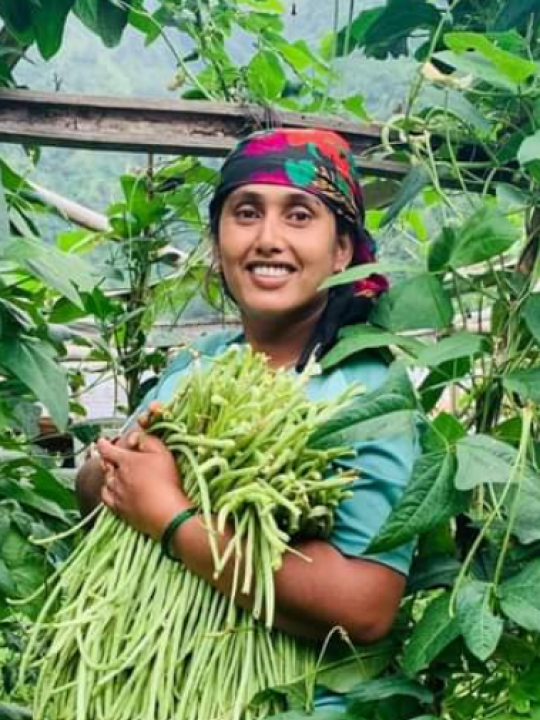
Sumitra Karki
Growing Dreams Together: Where Collective Farming Meets Entrepreneurial Spirit
Sumitra Karki's unwavering determination to create her own identity has been a guiding force throughout her life. While her husband, Padam, explored various ventures such as rice milling, poultry farming, and running a shop, Sumitra was right there, learning alongside him. Their village, Galkot, faced numerous challenges with subsistence farming, including low crop yields, dependency on rainfall, limited market access, and threats from wildlife. Witnessing the mass migration of youths to urban areas, leaving behind fallow terrace fields, Sumitra found inspiration in a successful model of collective farming in Palpa.
Motivated by this model, Sumitra introduced the concept of collective farming during a women's group meeting. Initially met with skepticism, the idea gradually gained acceptance. In 2019, the group secured a government grant to cultivate vegetables and onions, leading to the formation of the Melmilap Ekikrit Krishak Samuha collective farmers' group, with Sumitra at its helm.
The collective farming initiative has significantly boosted Sumitra Karki’s earnings. Today, the Melmilap Ekikrit Krishak Samuha produces a variety of high-value vegetables, including off-season crops grown in greenhouses. On average, each woman in the group earns between NPR 20,000 and NPR 25,000 per month from vegetable sales. Additionally, they have set aside a portion of their profits in a savings account to purchase seeds and lease additional land, further enhancing their financial stability. The collective’s success has not only provided Sumitra and her colleagues with a steady income but has also helped them achieve financial independence, making their voices heard within their families and the larger community.
In 2021, Sumitra joined the Daayitwa Rural Entrepreneurship Program, which significantly enhanced her business management skills, including bookkeeping, business planning, and financial management. She also gained technical expertise in mushroom and seasonal vegetable farming. The program's customized and contextualized Leadership and Management for Innovative Entrepreneurship Course further bolstered her leadership capabilities. This newfound confidence and resilience proved invaluable during the COVID-19 pandemic.
When the pandemic forced local markets to close, causing their vegetable harvest to go to waste, Sumitra adapted by sharing photos of their produce on her Facebook page. This initiative helped them establish contacts within the municipality, enabling them to market their vegetables despite the lockdown. The program also instilled in the entrepreneurs the belief that women's empowerment is crucial for achieving prosperity and that effective utilization of local resources leads to entrepreneurial success.
Today, the women of the Dudilabhati settlement in Galkot, who once relied on remittances and were confined to household chores, now thrive in cultivating valuable vegetables, including those in greenhouses. The seven women in the group work collaboratively, dividing their time between individual plots and the group's shared farm. They also equally share the profits, setting aside a portion in a savings account for purchasing seeds or leasing additional land. They have taken the initiative to lease 5000 square meters of land for millet cultivation, with Sumitra aiming to turn this venture into a model farm, showcasing the revival of this nutritious and climate-resilient indigenous crop.
Sumitra's enhanced leadership skills have enabled her to take on leading roles in community farming and various community organizations. "Women are often left behind in our society. But when we gain financial independence, our voices are heard in the family and the larger community. So my dream is to add more women to the collective and make them financially independent. For farmers like us, there is no better way," says Sumitra.
Collective farming, often associated with negative historical connotations due to Stalin’s policies in the 1930s, is finding a new and positive meaning in Nepal. It has become a way for women farmers to collaborate and compensate for the absence of men. In Baglung, where there is a high proportion of young men migrating to cities or abroad, women like Sumitra have taken over farming, transforming challenges into opportunities.
Sumitra's journey from being known merely as someone’s wife or daughter-in-law to establishing her own identity as a successful farmer-entrepreneur is truly inspiring. The women in her group find strength in numbers, cushioning them from various hurdles along the way. Despite the challenges of fluctuating prices, unpredictable weather, and other variables, they continue to thrive and support one another.
Sumitra dreams of adding more women to the collective, fostering financial independence, and creating a sustainable and prosperous future for her community. Her story exemplifies the transformative power of determination, community support, and innovative thinking in rural entrepreneurship. Sumitra Karki's journey is a powerful testament to the impact of collective action and the empowerment of women in achieving economic resilience and social change.
